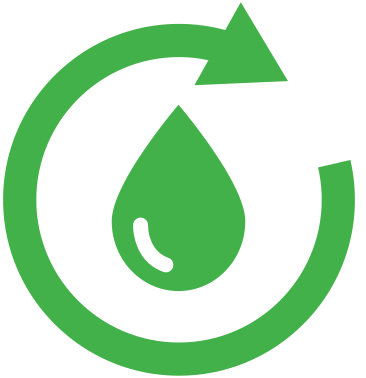Sustainability 2026 Vision
The basis of "the Meiji Group's Approach to sustainability" is to fulfill sustainability by putting the Group Philosophy into practice on a day-to-day basis in mainstay businesses and by remaining a corporate group society needs. Each Meiji Group employee will advance activities based on the Corporate Behavior Charter to meet stakeholders' expectations and continue fulfilling social responsibilities.
The Meiji Group’s Mission in Sustainability Activities
Toward the Meiji Group’s Next 100 Years, Designing a Future Where Everyone Around the World is Happy and Healthy.
The Meiji Group will mark the 110th anniversary of our founding in 2026. We must reconstruct our foundations with a view to the next 100 years to further enhance the Group’s corporate value. Currently, society is at a major turning point. Companies are required to not only expand their business scale but also contribute to solving social issues through their business activities. We will once again review the significance and role of our business activities in society and strengthen activities unique to the Meiji Group that originated from the idea of solving social issues.
The Meiji Group Sustainability 2026 Vision
As Food and Health Professionals, We Contribute to Addressing Social Issues through Our Business Activities, and to Realizing a Sustainable Society for People to Live Healthy, Peaceful Lives.
The Meiji Group Sustainability 2026 Vision is broken down into three themes: Healthier Lives, Caring for the Earth and Thriving Communities, plus the shared theme: Sustainable Sourcing. Here, we identify and set materiality issues and KPIs. Based on this framework, shown in the figure, we promote specific sustainability activities and address social issues.
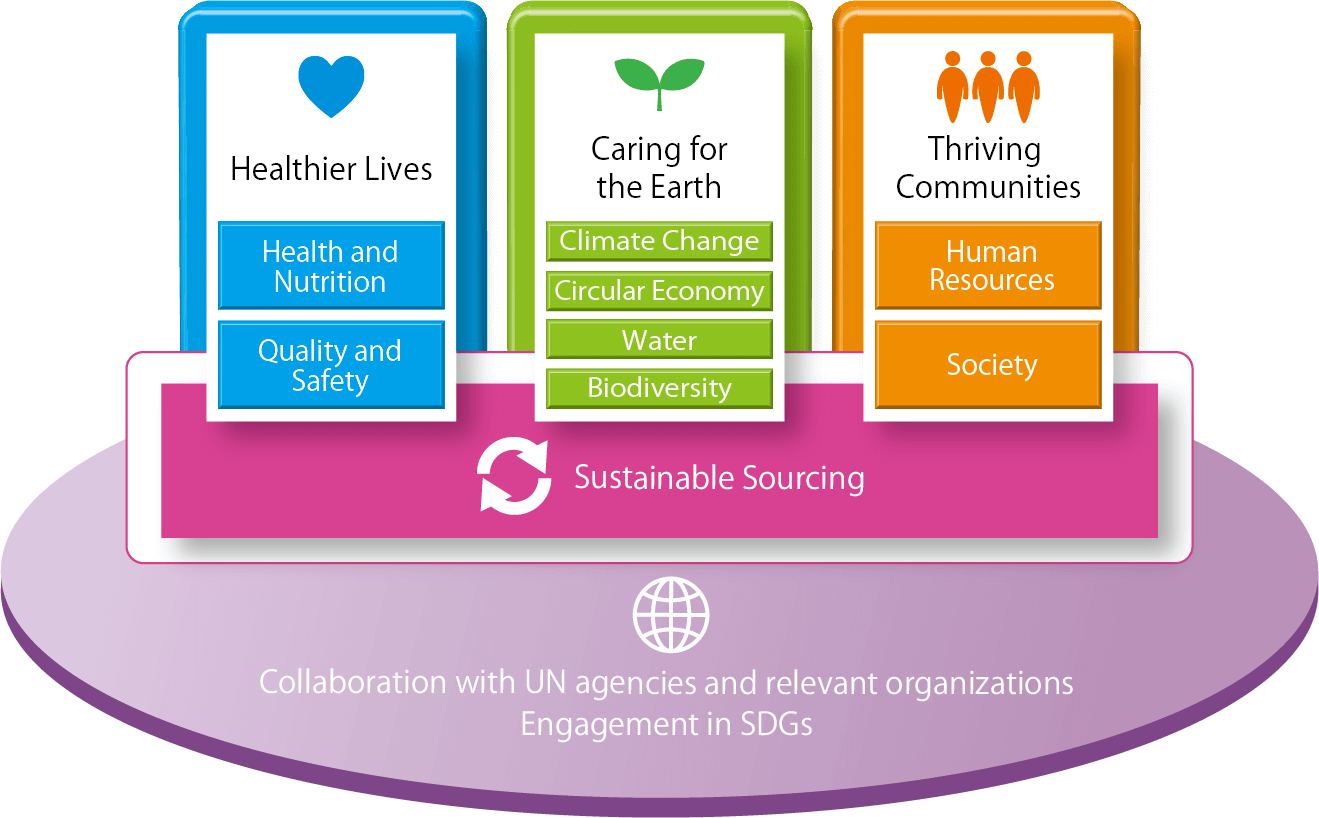
| Themes | Domains |
|---|---|
|
|
|
|
|
|
|
|
|
Meiji Group Sustainability 2026 Vision
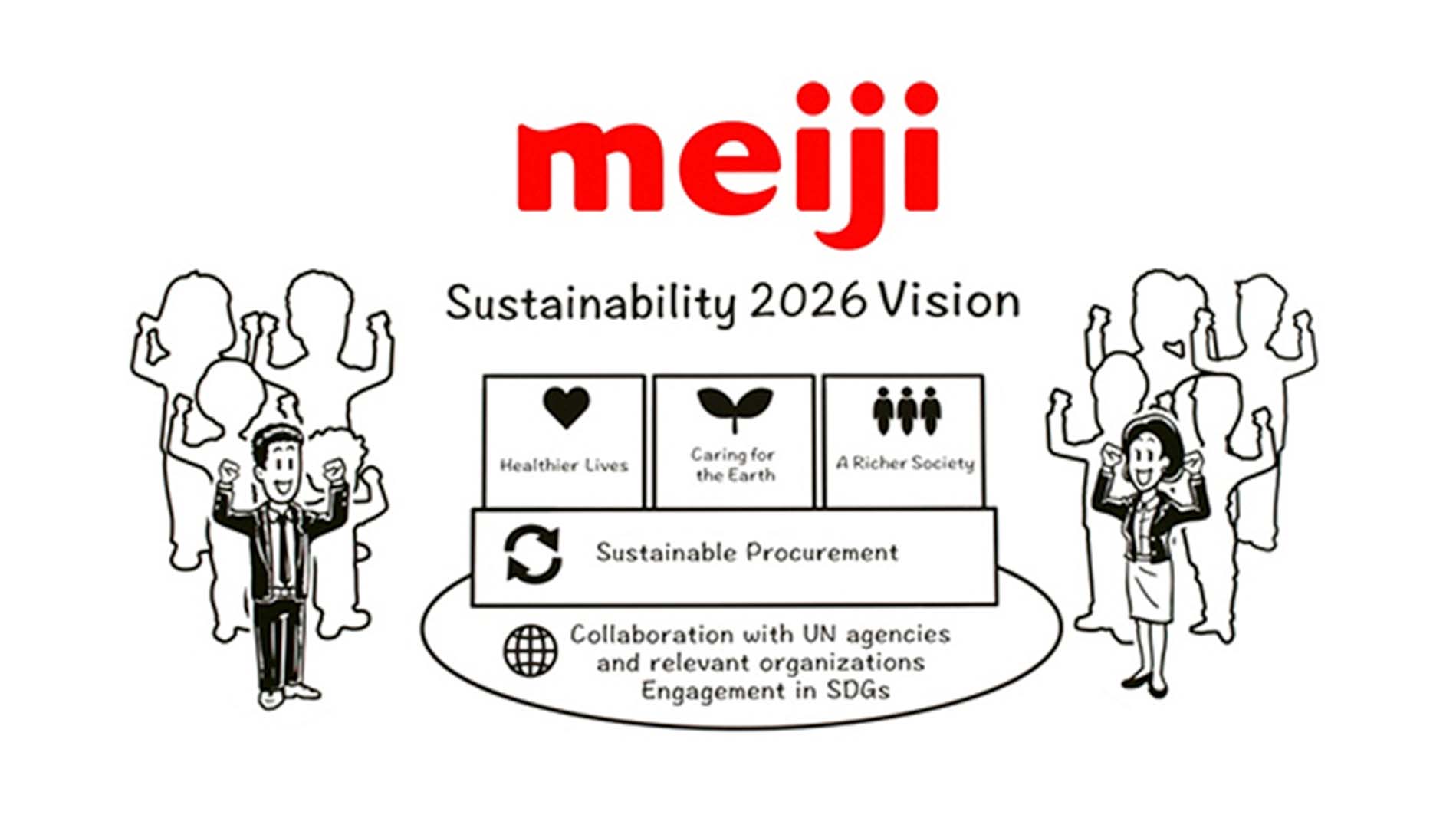
Approach toward SDGs
The Sustainable Development Goals (SDGs) are a collection of the 17 goals adopted by the United Nations in 2015 for the year 2030. In our endeavors, we have identified 13 primary goals that will contribute to society in the Meiji Group' business activities. Recognizing that FY2021 marks the beginning of "the Decade of Action"* to address the SDGs, we are working to achieve the SDGs through the Meiji Group Sustainability 2026 Vision.
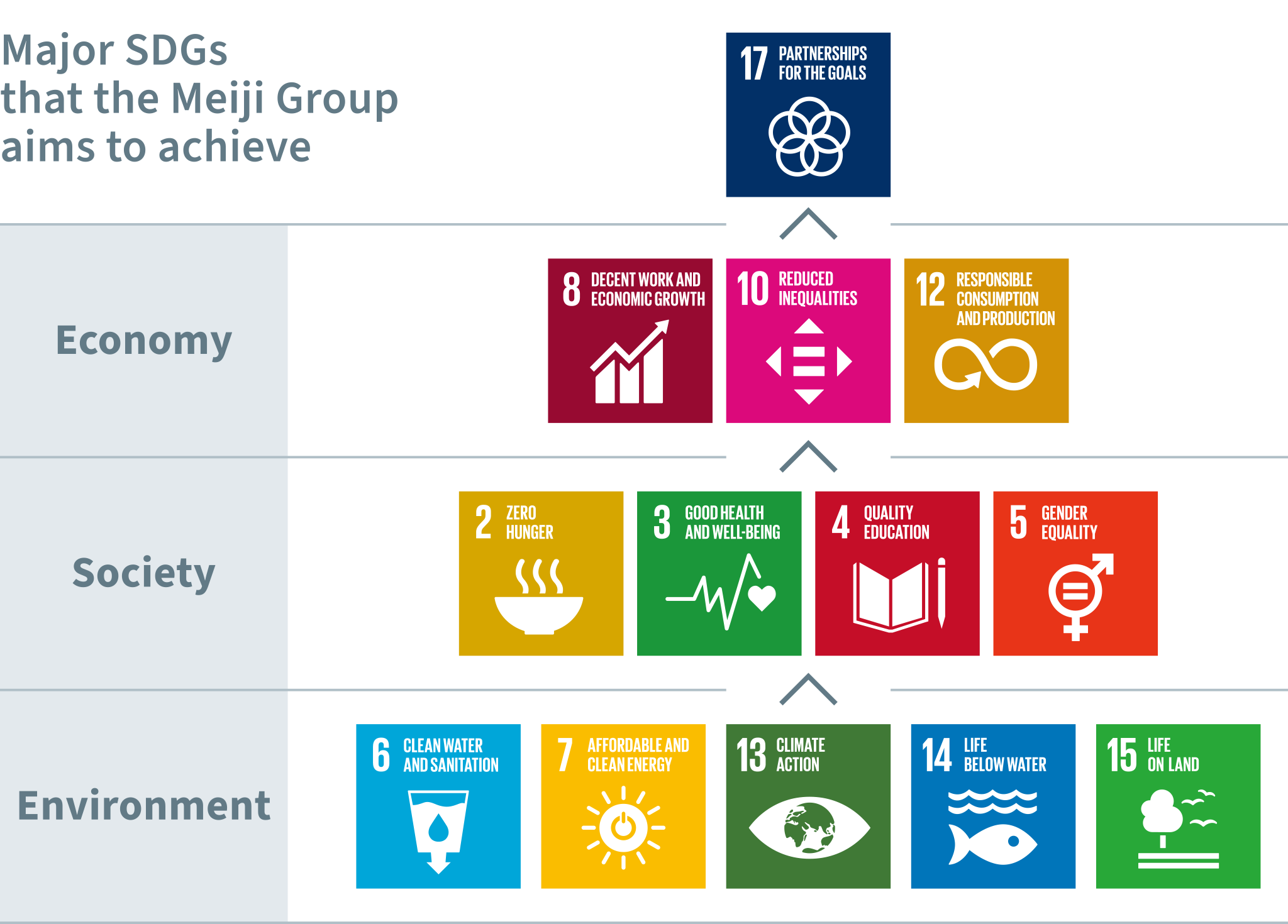 See how our sustainability themes link to the SDGs
See how our sustainability themes link to the SDGs
Meiji Group 2026 Medium-Term Management Plan
The Meiji Group has identified “fusing sustainability and business” as a key concept in the 2026 Medium-Term Management Plan. Sustainability activities in our business are becoming increasingly important. We plan to further strengthen our activities with the aim of becoming one of the leading sustainability companies in the global market.
Materiality in the 2026 Medium-Term Management Plan
The 12 materiality identified in the 2026 Medium-Term Management Plan are divided into four activity themes. These four activity themes can be characterized by two elements: initiatives that demonstrate the uniqueness of the Meiji Group and initiatives that serve as the foundation of our corporate activities. They are then positioned as materiality in a systematic manner. We have positioned “fusing sustainability and business” at the top of the list of activities unique to the Meiji Group. As an initiative that represents this activity, we will start an in-house certification system for Meiji Sustainable Products.
Structure of the Meiji Group' Sustainability Activities
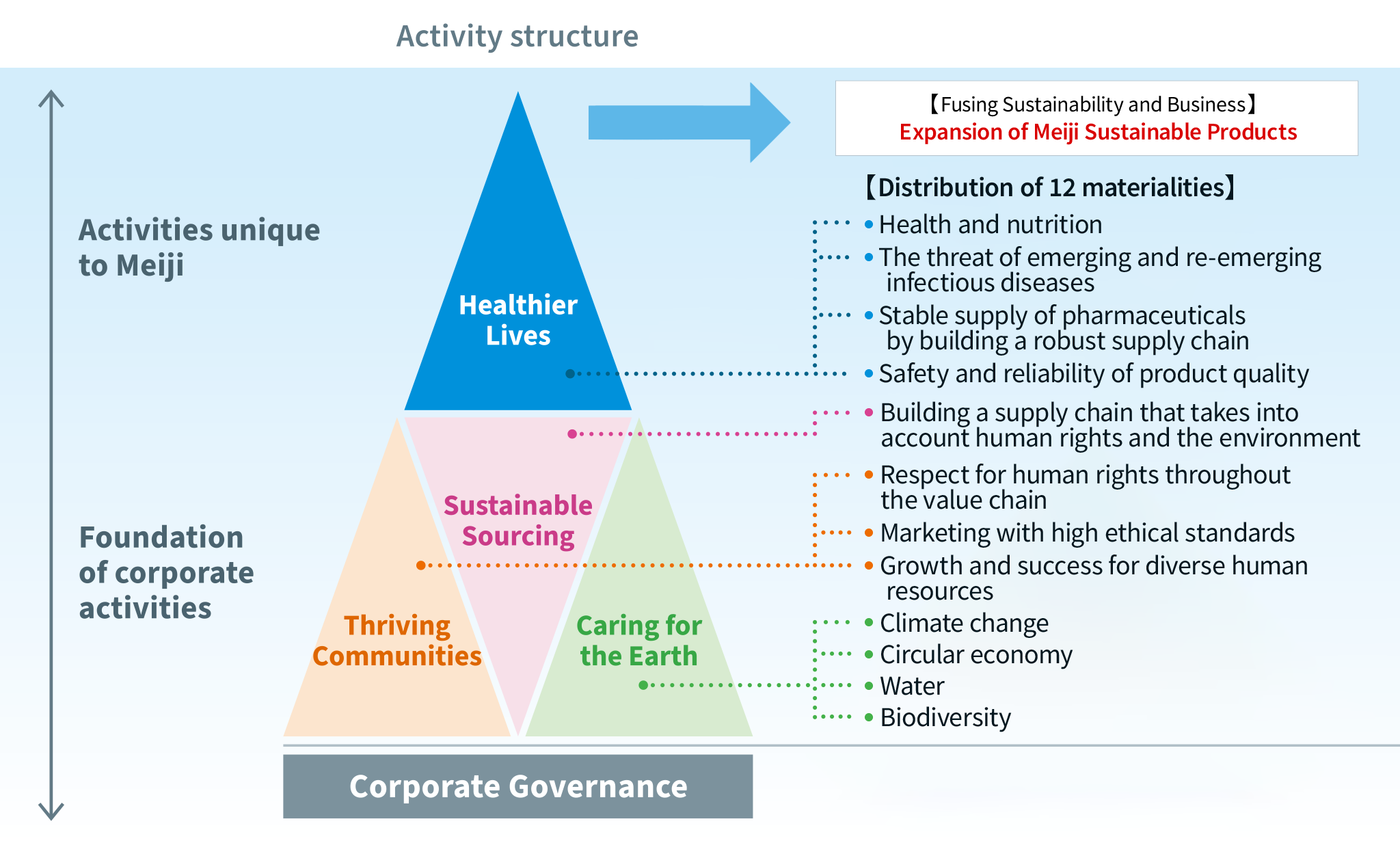
Position and Certification Criteria for Meiji Sustainable Products
Position
In-house certification system of the Meiji Sustainable Products certifies products that are involved in sustainability activities that contribute to solving social issues in each process of the value chain (development, procurement, production, logistics, and consumption).

Certification Standards
We have set original five standards. If products satisfy four or more of the five standards, the products are certified as “Meiji Sustainable Products”.
- Contribution to healthy dietary habits
- Improved nutritional value
- Human rights and environmentally conscious procurement of raw materials
- Human rights and environmentally conscious containers and packaging
- Reducing environment load in production, logistics and product designs
Materiality Matrix

Response to Materiality
Materiality/KPI List
We have created a medium to long-term vision for each materiality and formulated specific initiatives to be implemented in the 2026 Medium-Term Management Plan to achieve it. Please refer to the materiality/KPI list for major initiatives as well as the metrics, targets, and results that measure their results and progress.
Materiality/KPI ListSustainability Activities for Materiality
| Domains | Materiality | Related Page |
|---|---|---|
| Health and Nutrition | Health and nutrition | Healthier lives > Health & Nutrition |
| The threat of emerging and re-emerging infectious diseases | Healthier lives > Health & Nutrition > Preparing for Emerging Infectious Diseases | |
| Stable supply of pharmaceuticals by building a robust supply chain | Healthier lives > Health & Nutrition > Stable Supply of Pharmaceuticals by Building a Robust Supply Chain | |
| Quality and Safety | Safety and reliability of product quality | Healthier lives > Quality and Safety |
| Climate Change | Climate Change | Caring for the Earth > Climate Change |
| Circular Economy | Circular economy | Caring for the Earth > Circular Economy |
| Water | Water | Caring for the Earth > Water |
| Biodiversity | Biodiversity | Caring for the Earth > Biodiversity |
| Society | Respect for human rights throughout the value chain | Thriving Communities > Human Rights |
| Marketing with high ethical standards | Healthier lives > Health & Nutrition > Contribute to Healthy Diets > Nutrition policies and related measures | |
| Human Resources | Growth and success for diverse human resources | Thriving Communities > Human Resources |
| Sustainable Sourcing | Building a supply chain that takes into account human rights and the environment | Sustainable Sourcing |
Materiality Identification Process
Compilation of Issues
We compiled a broad list of environmental, social, and economic issues by referring to international guidelines such as SASB Standards and GRI Standards, which set industry-specific standards, as well as international frameworks such as the UN Global Compact.
Identification of Risks and Opportunities, Evaluation of Importance
We identified risks and opportunities in the food and pharmaceutical industries for each of the listed topics. We also extracted latent risks and opportunities to conduct an evaluation of importance from a medium to long-term perspective. In the materiality analysis, we conducted a quantitative evaluation based around two axes: “importance to stakeholders” and “importance to the Meiji Group’s business.”
For the “importance to stakeholders” axis, we rated importance on a four-point scale for each of the six stakeholders that were newly defined in the 2026 Medium-Term Management Plan (customers, shareholders/investors, employees, business partners, local communities, government agencies/industry associations). We then conducted a weighted evaluation from a multifaceted perspective that considers impact on the environment and society.
For the “importance to the Meiji Group’s business” axis, we used the International Integrated Reporting Council (IIRC)’s framework as a reference and rated importance on a five-point scale for each of the six types of capital that form corporate value (financial, manufactured, intellectual, human, social and relationship, natural). We then conducted a weighted evaluation for each of the six types of capital according to the amount that capital that would be damaged in the event of a risk and the amount that capital that would be increased through the business model in the event of an opportunity. The feature of this evaluation method is that it includes non-financial capital as well, so the evaluation is based on factors that will affect the future financial stock.
Identification of Risks and Opportunities, Evaluation of Importance
The results of the evaluation of importance were prioritized by the ESG Advisory Board after receiving opinions from three experts on the validity of the analysis process and the results of the analysis.
The Group Sustainability Committee exchanged opinions on the prioritization, reported to the Board of Directors, and materiality were identified.
Identified Materiality
We added “ quality and safety,” “biodiversity,” “stable supply of pharmaceuticals by building a robust supply chain,” and “ responsible marketing” as new materiality to the materiality identified in the 2023 Medium-Term Management Plan with the aim of achieving our Sustainability 2026 Vision.













